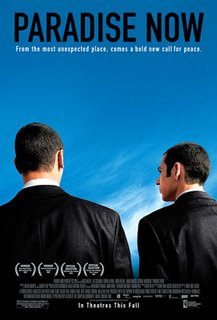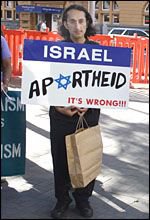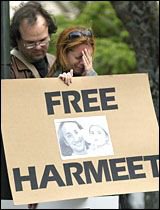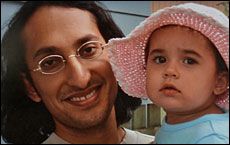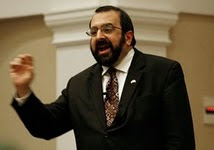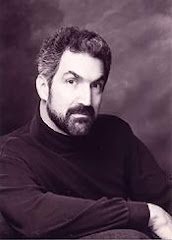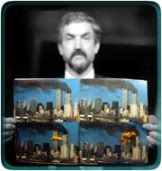It’s easy to dismiss Piers Akerman’s writings as just another example of tabloid rant. Yes, it’s true that much of his writing on “Muslim” issues is inspired by (or, at best, laced with) ignorance. He clearly has little understanding of the variety of Muslim cultures that exist in Australia. His simplistic analysis and neo-Conservative politics don’t help.
I could spend many a paragraph hacking into the simplistic and spurious analysis of Mr Ackerman. In fact, I’ve done so on numerous e-mail groups over the past 2 years or so. But then, the fact is that we still read what he has to say. So do hundreds of thousands of others.
We have to keep in mind what is Ackerman’s role in writing his pieces - to express an opinion, to generate a response and to give his readers something to think about. The fact that so many people spend so much time criticising him means that Ackerman has achieved his goals.
And amongst all the invective, some real home truths emerge. His Christmas day article is an example of this.
As is his usual practise, Piers has a go at the real enemy – those he describes as the feel-good left-wing media mainstream. Piers’ usual targets are the ABC and “its print arm, the Fairfax press”.
He claims this sector has engaged in hypocrisy in its reporting of both the Nguyen execution in Singapore and the Cronulla riots. He commences his Cronulla analysis as follows:
Similarly, the usual suspects determined to paint Australia as a nation of knuckle-headed racists were quick to slander fellow citizens when a drunken mob turned on young Lebanese Muslims at Cronulla.
On the surface, Piers distinguishes between “fellow citizens” and “young Lebanese Muslims”. For some of us regular Piers critics, that would be a tempting analysis. Except that the point Piers is perhaps trying to make is that all Australians are demonised as racist by certain sectors of the media. Further, he acknowledges that the attackers were a “drunken mob”.
What Piers should know is that in most people, an excess of alcohol generally removes inhibitions and enables people to speak more freely and honestly. One wonders if the same crowd would have pulled off the same violent riots without alcohol.
Piers also ignores police and intelligence reports of white supremacist groups’ involvement in organising and directing the riots. Perhaps his response would be that white supremacists do not represent all Anglo-Australians.
But then, what’s good for the goose is also good for the gander. One hopes that Piers will one day recognise that a handful of lawless young Muslims do not represent the attitudes of 300,000-plus Aussie Muslims.
Piers then makes mention of certain manifestations of “the troubled minds of younger members of the Arabic-speaking Muslim community”. These include gang rapes, drive-by shootings and convoys smashing cars and destroying property. Piers also implies that Lebanese Muslim youth are behind a recent attack on a church in Auburn, though at the time of writing his piece police had laid no charges on that ugly incident.
The meat of Piers’ argument can be found in the next few paragraphs.
Decades of politically correct policing have failed lawless young Muslims, and their self-appointed leaders have done nothing to assist their entry to Australian society. The very notion of multiculturalism giving all cultures equal standing is fundamentally flawed.
Piers is far more honest than some of the op-ed writers at that most tabloid of broadsheets, The Australian. He at least is honest enough to state that he doesn’t regard all cultures as equal, thus implying a belief that Anglo-Australian culture in inherently superior. Piers attacks the heart of multicultural policy, unlike many op-ed contributors to The Australian who pretend to attack only one or two symptoms.
Yet the concept of cultural eugenics should really be left to WWII Germany where it belongs. What Piers should be talking about is the cultural irrelevance of those Piers rightly describes as “self-appointed leaders” of Muslims.
Piers displays an advanced degree of ignorance in the following sentence.
There is no way the misogynistic values of Sharia law can be equated with the values of equality embedded in Australian law.
Whether Piers likes it or not, there are many values of sharia (the Arabic name given to the broad corpus of Islamic legal traditions) which are in fact embedded in Australian law. For instance, the emphasis of our commercial law on mediation and arbitration is (according to at least one Australian judge and jurist) directly borrowed from classical sharia.
Piers should also consider exactly what are the values of sharia. He might, for instance, consider reading the transcript of a lecture given by a senior lawyer and representative of the largest Islamic organisation on earth, the Nahdlatul Ulama of Indonesia.
Muhammad Fajrul Falaakh told a packed audience at the Centre for Independent Studies that in the world’s largest Islamic nation, sharia law is associated more with the gender-neutral areas of banking and finance than with criminalising sexual behaviour.
Mr Falaakh made these comments in 2002. The most recent Indonesian election results show that not much has changed. As SBY knows full well, running on an election platform of fighting religious extremism and terrorism gains you plenty of votes.
But that’s Indonesia, our closest neighbour. At home, I am not aware of a single Muslim group that calls for the introduction of sharia into Australia. Even the fringe Hizbut Tahrir group have ruled out any attempt to campaign for an Aussie version of sharia.
Australia should promote itself as cosmopolitan, reflecting the contributions of migrants who have achieved their dreams here, not laud those who proclaim their allegiance to failed Middle Eastern states.
And who does that, Piers? Which Middle Eastern state do I proclaim my allegiance to?
The only Muslims I know who keep swearing allegiance to foreign governments are the very self-appointed leaders Piers criticises. Even the Lebanese thugs who attack surf lifesavers don’t do so in the name of a Middle Eastern government.
Perhaps Piers should be asking John Howard why he keeps giving legitimacy to these self-appointed leaders. Why does he and his Attorney-General keep visiting the institutions managed by the Saudi Government’s paymaster in Sydney, to the exclusion of other schools and institutions? And why does Piers' favoured government insist on inviting these self-appointed leaders to reference groups and summits?
Piers is right about the self-appointed leaders. Yet these same leaders sit in their positions and take funding for projects they never implement beyond employing their otherwise unemployable relatives.
Piers knows as well as I do that the government wants these sources of idiocy to rule the halal roost in Australia. Why? Because these fools cannot engage the government on equal terms in policy, media or law reform. The government would rather have compliant peak body leaders who will suck upto John Howard in the same manner as they have sucked upto King Fahd and Colonel Gaddafi for all these years.
Piers' favoured conservative government prefers to deal with the mafia of middle aged migrant men. It wants to promote organisations that don’t involve women and young people. Because such bodies will not challenge the government’s agenda.
Muslim communities should look hard at those who claim to represent them and ask whether they are genuinely attempting to promote integration into our society.
Actually, the allegedly conservative government should look hard at who it chooses to promote as so-called “moderate” leaders. The government should ask itself what scandals will erupt when it turns out the organisations it sponsors and funds have been involved in a range of financial and other improprieties.
Perhaps, Piers, you should have a chat to one of your colleagues at The Australian (the news section, not the fringe op-ed section) who is busy collecting a range of material on a variety of individuals and organisations associated with the Muslim Community Reference Group and its sub-committees.
Then again, much of the reason these people are in their positions is because ordinary Muslims are too busy with their jobs and businesses to deal with the problem. Aussie Muslims are too busy being Australian to worry about communal issues. They are too concerned with the same mainstream issues and struggles facing their fellow countrymen and women of other faiths and no faith in particular.
Young Muslims who proclaim they are Australian might, for example, explore the anathematisation of co-operation with non-Muslims preached by many imams.
Again, which imams preach this? One could accuse local imams of many things. One could accuse them of not being able to speak English. Or of being too busy fulfilling irrelevant cultural roles imposed on them by the management committees of mosques. Or of only working as hard as their measly salaries can justify.
Maybe Piers should sit down with imams and find out what they preach. But that would mean having to learn Arabic and perhaps half a dozen other languages – Bahasa Indonesia, Arabic, Farsi, Urdu, Bangla, Bosnian, Turkish and Albanian.
Young Muslims should ask questions about why their mosques are divided along ethnic lines. They should also be asking what sort of education their imams have and whether an accreditation system can be established so that imams fulfil genuine pastoral roles of relevance to English-speaking Muslims in a Western country.
They might ask why their so-called leaders leave them feeling alienated, why their communities place so little emphasis on education, and why unemployment is endemic among Muslims.
Excuse me, Piers. Which Muslim community are you talking about? Are you talking about the Indians and Pakistanis and Bangladeshis who all want to send their kids to Sydney Grammar or Wesley College? Or the Egyptians and Palestinians who want their kids to become doctors and lawyers and bankers?
Are you talking about the new and growing Islamic independent school sector that has produced some of the most outstanding academic results in New South Wales and Victoria?
Perhaps Piers should visit Friday prayers at a university and speak to some of the young people there. He’ll find a range of students at undergraduate and post graduate level.
Perhaps most importantly, Piers might ask himself why the Australian Bureau of Statistics does not report unemployment figures according to religious affiliation.
There is no underlying racism preventing Lebanese, or anyone else, from participating positively in our society.
I have no complaint with this phrase, beyond saying that a lot has to do with which area of work or activity a person chooses to involve him or herself in. And at the end of the day, being visibly Muslim may be tough, but it is a breeze compared to being visibly Aboriginal or Torres Strait Islander.
Lebanese Christians have been central to the mercantile life of this nation for more than a century; Lebanese Muslims should ask themselves why they have marginalised themselves.
I can only presume Piers doesn’t bank with the National Australia Bank, and doesn’t read the Australian Financial Review magazine. I also presume Piers doesn’t follow Australian Rugby League football, nor had he ever been represented by some of Australia’s top commercial law firms.
Australians of Lebanese Muslim background can be found in all fields of endeavour. Indeed, Mr Ackerman’s own newspaper recently engaged a student of Lebanese Muslim background from the University of Western Sydney as a cadet journalist.
The October 2005 edition of the Australian Financial Review magazine was devoted to power and who wields it in Australia. In the area of financial services, the AFR named Ahmed Fahour (head of the NAB’s Australian and Asian banking division) as being in the top 5. His influence, both as a former player in the New York office of Citigroup and in his current role at the NAB, gives him “the power to redraw the battlelines in Australia” in the finance industry.
Finally, there is nothing inherently conservative about creating demons out of ethno-religious communities. Conservatives love to speak of their loyalty to their “Judeo-Christian” heritage, all the while forgetting that both Moses and Jesus taught a message based on love for all peoples.
British conservatives such as William Wilberforce were at the forefront of agitating for the elimination of slavery from the British Empire. Conservatives have a proud tradition of recognising the inherent virtues of all peoples regardless of race, religion or colour. Those conservatives who seek to marginalise and demonise people on the basis of their ethno-religious heritage are showing complete disdain toward the essence of Western conservative traditions.
Just as those who wish to impose their alien and irrelevant values and administrative practices on a largely locally-born community are going against the grain of Islamic values and heritage.
© Irfan Yusuf 2005



